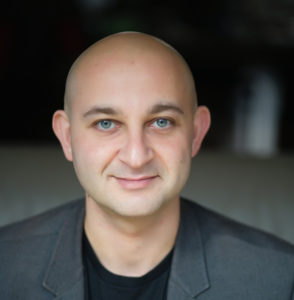Bayer: We Are Looking For A Solution That Can Help Us Determine the Cognitive Power Of The Patients


In the beginning was the aspirin. Today, 155 years later Bayer is still producing it, but the multinational is now looking at potential products that go far beyond the pills. While drug discovery has not lost its value, the development of life science prevention of diseases and conditions as an area has experienced an uptake. This applies 100% to Bayer too. And the company is naturally looking for answers to the big questions, sometimes for big questions, and not least – for disrupters who would provide these fresh perspectives.
Since 2013, Group’s digital health initiatives were combined under the name G4A, a global program, currently operating in twelve countries. Formerly Grants4Apps, the program already has three existing programs under its hat that cover all the stages of development – Accelerator, Dealmaker and Generator. For the past six years, G4A has supported over 149 digital health companies resulting in 29 direct collaborations with companies such as Agamon, KinAptic,Turbine, and xbird.
The applications for this year’s track are open till May 31 and the company is looking for startups with solutions in digital therapeutics, AI for drug discovery, patient engagement platforms and more. To find out more about what Bayer is actually after, we talked to Eugene Borukhovich, Global Head of Digital Health at Bayer.
Trending Topics: What type of innovations is a pharmaceutical corporation like Bayer looking for?
Eugene Borukhovich: We are looking for innovative solutions in cardiovascular all around to help patients adhere to their therapies. Also, around dermatology – we already use digital technology to identify different types of acne. Some of those solutions are very adjacent to our core businesses today.
But we are also looking for the next big thing that is not necessarily part of our business today. Pharma has been talking about this “beyond the pill” for quite a long time. With digital therapeutics, it is now becoming a reality, meaning it is evidence-based and clinically validated. The next steps are things like Neurotech. If you tie together digital therapeutics, behavior modification and understanding of the brain, we can help consumers become more aware of how those processes affect our bodies.
Any particular examples that fit into your strategy?
In the past year, we as a team, were much more truly focused on our core businesses. Some of the more successful startups are in the field of small molecule discovery, like the graduated in 2016 Hungarian company – Turbine, that creates a ‘simulated cell’, which replicates the inner workings of real cancer cells in a fully-interactable, digital model. We also took a biotechnology company called Cyclica that is driving drug discovery by empowering scientists in pharma with an integrated cloud-based and AI-augmented platform, which has already raised $6M.
As mentioned, one of the very hot topics for us right now is the impact of patients’ cognitive behavior on their healing process. We are looking for a solution that can help us determine the cognitive power of the patient at the time. Yet, we don’t really have an idea what that would look like. That is part of that discovery process.
Is it extremely hard for a startup to get through the filter of a corporation, especially in highly regulated sectors like pharmaceuticals? What are the challenges that young tech companies face when trying to enter this universe?
As a team, we’ve had such problems a lot. We’ve brought companies to the table and they were told it is a digital agency supplier. For us, as the innovation team inside Bayer, to get to the point where we have compliance, due diligence is already done through the process. The other thing is, and this is an important one, to start looking at startups as partners. They are not and cannot be vendors, what would be typically expected by a corporation. It applies especially in the world when you don’t know what the model is, it needs to be a true partnership.
What is the stage of development of companies that are ready to enter such partnership with a corporation?
For example, the program that companies can apply for right now, is suitable for a ready-to-partner mature companies with a product in the market and ones in the pre-product launch stage. The selected startups will take one-time initial funding of €50K with the option to receive another €50K in convertible notes from business owners.
In terms of regions, where do you think we need the most dramatic shifts?
Entrepreneurs are everywhere. The question becomes – do you want to help your own country and region and hack the way out of the status quo or are you chasing the money to go to raise somewhere in the west. In any case, pretty much everywhere the system is screwed up.
What about the CEE region?
There is a lot of great technologists, but the technology is useless unless you can put it in people’s hands and have them use it. I was recently in Kiev, where I had over twelve conversations where I just didn’t understand what the value proposition is, even though I have a tech background. Generally, in CEE there are great technologists that can invent the next best algorithm, but they need to work on commercialization thinking.
There are those hyped technologies everyone is talking about and we are still looking for real applications. Do you think Blockchain for instance has a role in healthcare?
I personally don’t really believe that we are near a mainstream adoption. There is just too much buzz around it. Let’s take the example of blockchain application for authentication of products in the supply chain process. For example, when it comes to Alzheimer’s disease, the supply chain has more than 30 different stakeholders. At the end of the day, it’s pretty hard to get all of them on the blockchain.
What about AI?
It’s less about technologies and more about the big questions are that we need to answer. AI is one of the promising technologies, no doubt. Taking natural language processing as an example, just look at the amount of valuable text that practitioners write, and the structured data held in Electronic Records that can now be processed by AI programs. This could be a major shift. Yet, there are more than twenty underlying technologies that need to be covered before we even start talking about AI. You just need to look at it, case by case.
How long it is until we determine the sequence of the human genome?
We are at least ten years away from this to happen. In Bayer, we joined forces with a company called CRISPR Therapeutics that works in the area of gene editing. This is a joint venture aimed to discover and develop potential cures for serious genetic diseases. Yet, we are far away from anything that could be launched on the market.
If there is one thing you want to change through the years in this area what would that be?
Where my interests are, and I think where the team is driving, this is how do you look in non-molecular solutions to really empower people to understand their bodies and what you can do around behavior change. Further development on how you run self-care, food as medicine, nutrition, what are biomarkers that can help you determine things earlier. Currently, our team is working to package certain digital solutions, while also have our eye on nonmolecular therapies.




























